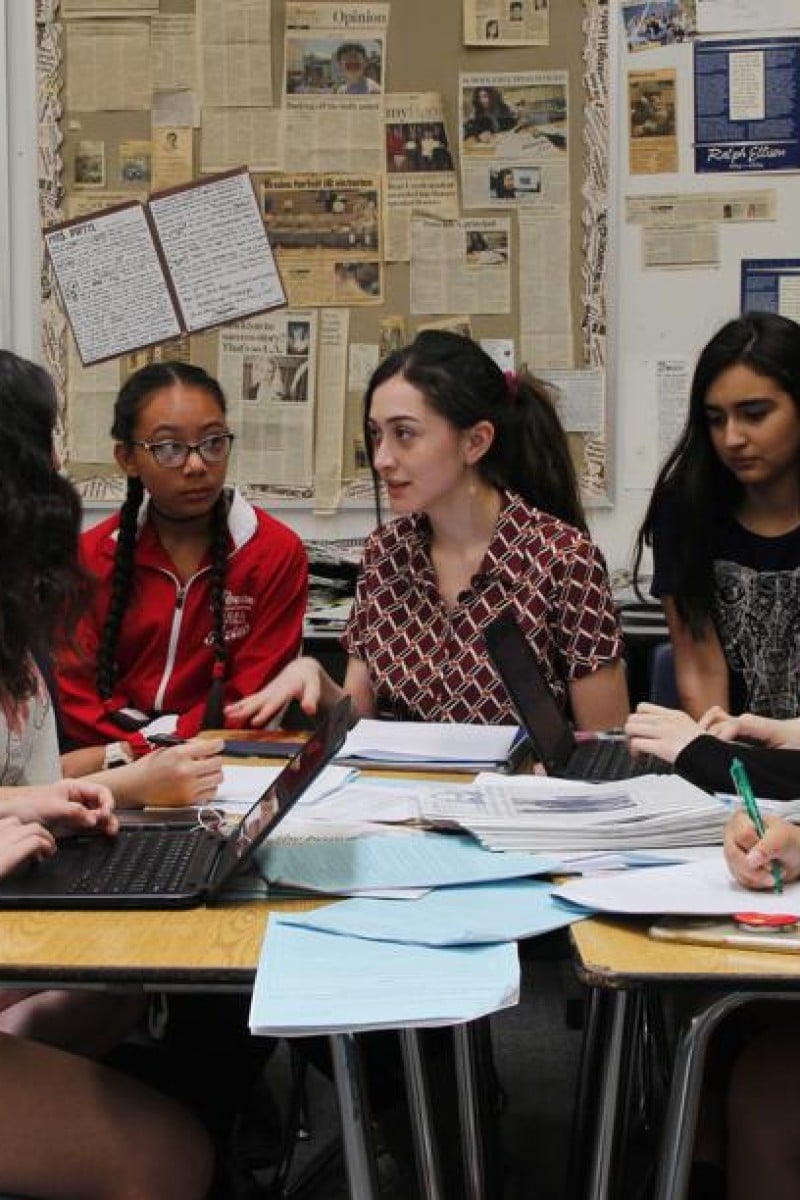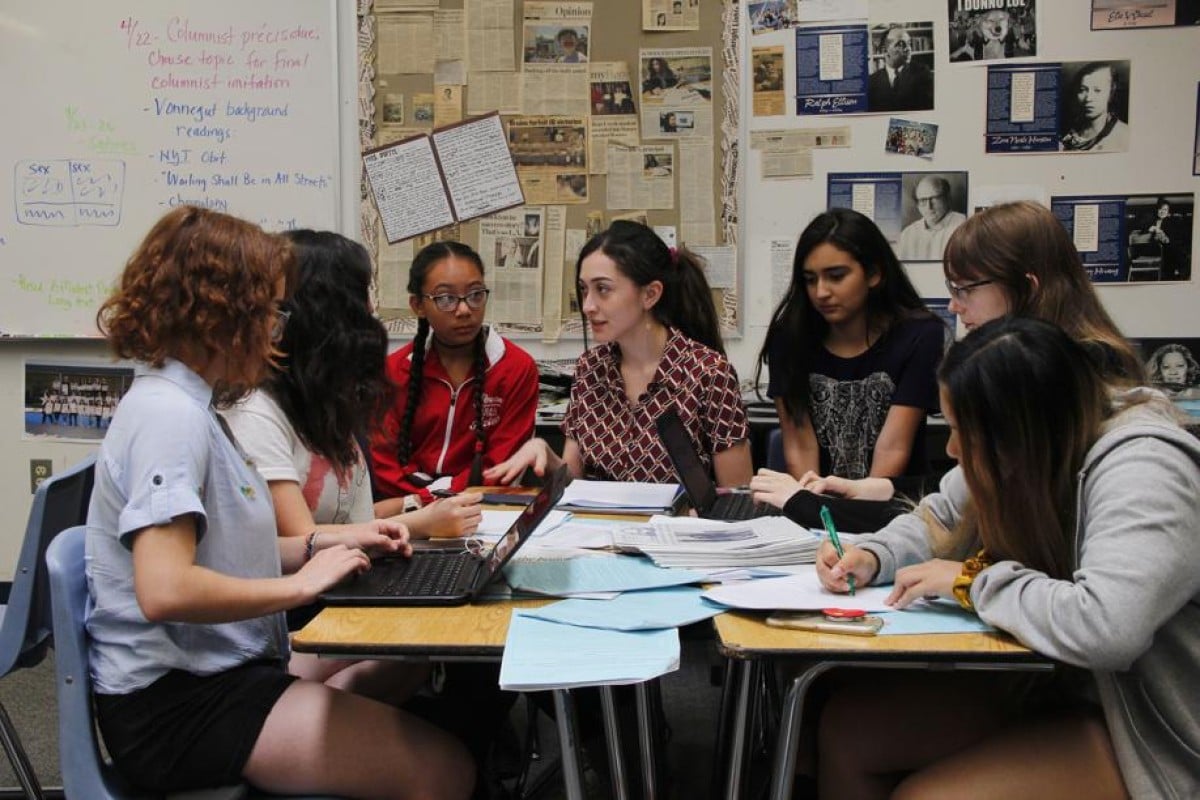
Press Freedom Day 2019: School newspaper facing censorship over profile of student working in the adult film industry
The editorial team of the 'Bruin Voice', a student publication in the US, is fighting to uphold freedom of speech and freedom of the press
 The editorial board believes their fellow students have a right to read the story.
The editorial board believes their fellow students have a right to read the story.The whispers wound their way through the hallways of Bear Creek High School in Stockton, in the US state of California. They said a final-year student at the school was working in adult entertainment.
Her name came up in March at a pitch meeting of the Bruin Voice, the award-winning high school newspaper, whose motto is: “The Voice shall not be silenced!”
Someone said, “There’s a girl on our campus who does porn.”
The student journalists knew what to do - a profile of the girl, or, really, the woman. She’s 18.
A writer and editor for the paper, Bailey Kirkeby, volunteered. She felt comfortable approaching the target of the rumours because both of them participated in speech and debate. The subject agreed to cooperate, even asking that her name be used. A legal adult, she wanted to tell her story, hoping it would quiet the whisper network.
The profile is almost complete, set to be published in Friday’s issue of the newspaper, which is led by an all-female editorial board. May 3 is World Press Freedom Day, the irony of which will be revealed in a moment. The piece charts the student’s path into the porn industry, including a fight with her parents that led her to leave home last year. It humanises her, said Bailey, a 17-year-old student. One thing readers may not know, she said, is that their classmate is a “romantic”.
Now, however, the story is encountering stiff resistance from school administrators. The officials are threatening to dismiss the newspaper’s advising teacher - who was recently named educator of the year by the Northern California Society of Professional Journalists - if she doesn’t submit the article to them for prior review.
The demand, which has become more frequent nationwide as students have taken on sensitive topics ranging from sexuality to gun violence, has opened a bitter debate over censorship and free expression in California’s Central Valley. The students are pushing back, as they have done at schools all over the country, including in the District of Columbia, where the country’s capital is. There, journalists at Woodrow Wilson High School reached an agreement with their principal in 2015 to end the policy, opposed by aspiring young writers.
The contest over student press rights is unfolding as President Donald Trump continues to deride journalists as the “enemy of the people” and as the United States is downgraded to 48th among 180 nations in the 2019 World Press Freedom Index.
It is within this context that the teacher who advises the editorial team, Kathi Duffel, has remained resolute in her refusal to seek the district’s approval to run the story. She says the rights of her students are on the line.
“I tell the kids, ‘Free speech isn’t free, is it?’” she said in an interview with The Washington Post. The prospect that she could lose her job - one she has held for more than three decades - brings her to tears, said Duffel, 57.
In America, the right to free speech is protected by the law known as the First Amendment.
Along with the First Amendment, there are other values at stake. One of them, she said, is sheer storytelling.
“This young woman has quite a story to tell,” Duffel said. “She has every right to tell her story, and we have every right to report it.”
Student reporters shape their school’s stories; here’s why school newspapers are so important
It’s not the first time Bruin Voice staff has tangled with school administrators. Along the way, the young journalists have been guided by Duffel, who was recognised in 2015 for her “unwavering supporter of the paper’s independence and First Amendment rights”
In 2011, a Bear Creek principal, who later resigned, sought prior review of a story about a set of master keys that he had misplaced, costing the district “thousands of dollars in rekeying costs,” according to the Record.
And in 2013, a front-page story raising questions about the school’s safety policies led the principal at the time to confiscate 1,700 copies of the issue, until district officials forced her to loosen her grip. She and the vice principal were soon asked to resign. The same year, the school district was forced to backtrack on a social media policy after a story in the Bruin Voice enumerated possible penalties faced by student athletes and club members, causing an uproar.
The Bruin Voice won recognition that year as a top high school paper from the National Scholastic Press Association.
“I’m very proud of our programme,” said Duffel, who teaches language and composition in addition to journalism. “We teach our students how to be critical thinkers. Meanwhile, we have an administration that just doesn’t seem to understand that we have a First Amendment that needs to be respected.”Duffel attended secondary school in the same district, at Tokay High in Lodi, California, after moving to the Central Valley from Canada in 1978. She studied journalism and English at the University of the Pacific, where her roommate was editor in chief of the campus newspaper, the Pacifican, and coaxed her to get involved. She went to work for the district in 1986 and began at Bear Creek when it was founded five years later.
“I am a 33-year employee with the Lodi Unified School District,” she said with pride.
But her future employment stands in doubt.
